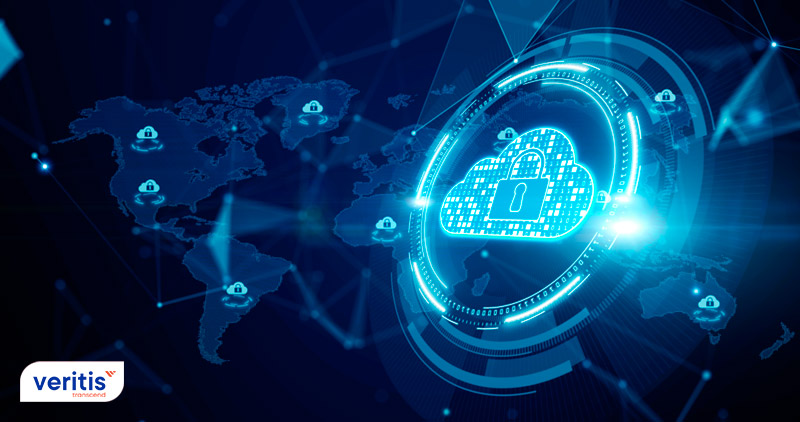
Table of contents
- What is Cloud Computing Security?
- Why is Cloud Security Important?
- Advantages of Cloud Data Security
- What are the Principal Cloud Computing Security Considerations?
- What are the Security Risks of Cloud Computing?
- What Types of Cloud Security Solutions are Available?
- How Should You Approach Cloud Security?
What is Cloud Computing Security?
Cloud is one of the technologies which is being embraced faster than ever. Due to the pandemic or increased appetite for solutions, companies are integrating their infrastructures with the cloud. Given the various benefits of the cloud, this was only to be expected as the digital age accelerated the speed of our lifestyles with interconnectivity and the Internet of Things (IoT). Companies met the increasing demands by adopting DevOps and other methodologies, which fostered collaboration. However, with every positive thing, a downside affects a company’s adoption and overall productivity.
With the cloud one of the preferred technologies by companies worldwide, threat actors have realigned their attack strategies and have started targeting cloud solutions. So naturally, this raises the question of the security risks of cloud computing. In this age of innovation, cloud computing security is one of the primary concerns of many cloud users. While various cloud security solutions are available in the market, it becomes pretty befuddling to understand the most appropriate solution.
While robust cloud computing data security solutions exist, one should consider the existing and potential cloud computing security issues to choose the right cloud infrastructure security solution. In this blog, we shall understand why cloud security is essential, the security risks in cloud computing, and other cloud computing security challenges.
Why is Cloud Security Important?
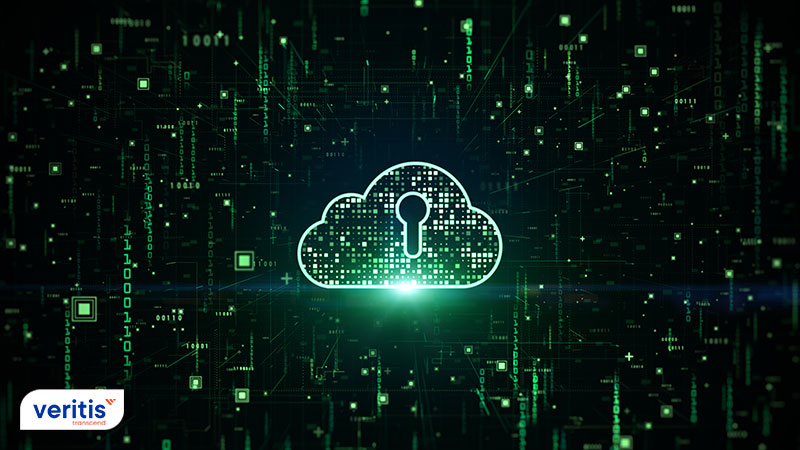
A group of rules, controls, procedures and technologies come together to form cloud security, often called cloud computing security, to protect infrastructure, data, and systems hosted in the cloud.These cloud computing security solutions are set up to safeguard cloud data, assist with regulatory compliance, protect consumer privacy, and establish authentication policies for particular users and devices. In addition, cloud security can be customized to precisely meet the company’s requirements, from verifying access to traffic filtering.
Additionally, administration costs are decreased, and IT teams are given more freedom to concentrate on other aspects of the business because these rules can be created and handled in a single location. The particular cloud provider or the installed cloud computing security solutions will determine how cloud security is delivered.
Strong cloud security is crucial for companies moving to the cloud. Unfortunately, cloud network security threats are growing and becoming more complex, and cloud computing is no less in danger than on-premise infrastructure. Working with a cloud security provider who provides best-in-class security tailored for your infrastructure is crucial.
Useful link: Cloud Security Automation: Best Practices, Strategy, and Benefits
Numerous Advantages of Cloud Data Security Include:
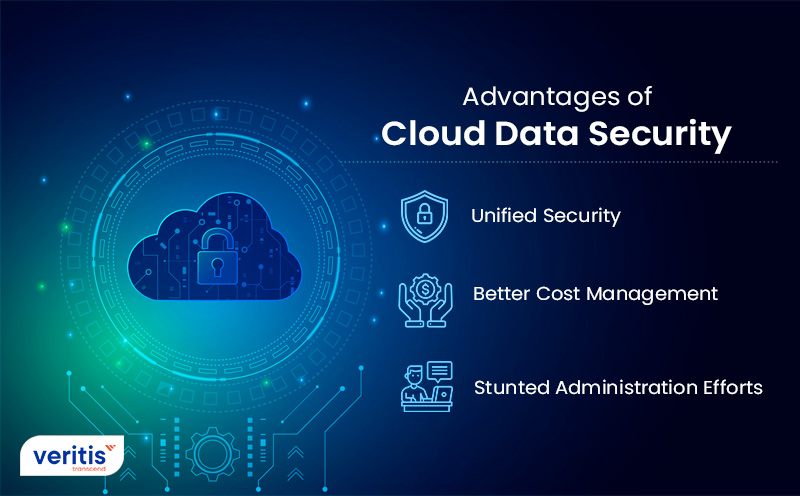
• Unified Security: Cloud security is centralized in the same way that cloud computing is centralized in terms of apps and data. Managing the many devices and endpoints that make up cloud-based company networks can be challenging when dealing with Bring Your Own Device or shadow IT. The monitoring of network events is simplified, traffic analysis and web filtering are improved, and there are fewer software and policy upgrades due to managing these entities centrally. Disaster recovery plans may be readily created and carried out when handled in one location.
• Better Cost Management: One advantage of using cloud security services and storage is that it eliminates spending money on specialized hardware. This lowers administrative costs in addition to lowering capital expenses. Cloud computing data security solutions offer proactive features that provide protection around-the-clock with little to no human interaction, replacing IT teams’ reactive firefighting of security concerns in cloud computing in the past.
• Stunted Administration Efforts: Manual security configurations and nearly continual cloud data security updates are a thing of the past when you select a trustworthy cloud services provider or cloud security platform. These duties can be quite resource-intensive, but when you shift them to the cloud, security administration is handled entirely on your behalf in one location.
Useful link: How to Enhance Security in the Multi-Cloud Era
What are the Principal Cloud Computing Security Considerations?
The cloud security guidelines are intended to assist you in selecting a cloud service provider that satisfies your security requirements. You will need to think about how you configure your cloud security services securely independently. Cloud computing data security solutions and software must abide by these rules.
We outline each of the principles as follows:
• Data in Transit Protection: It is the first rule. As it travels over networks inside and outside the cloud, your cloud data security should be sufficiently safeguarded from alteration and eavesdropping. Combining encryption, service authentication, and network-level security measures should be used to achieve this.
• Asset Resilience: Your data should be safeguarded against physical manipulation, loss, damage, or seizure, and the assets used to store or process it. In addition to mitigations like encryption, cloud data center security, secure erasure, and service resilience, protections should encompass the laws to which your data is subject.
• Operational Security: Operational Security is quite pertinent. To hinder, detect, or prevent attacks, the cloud service must be administered and managed securely. Effective vulnerability management, protection monitoring, configuration & change management, and incident management will be used to accomplish this.
• Supply Chain Security: Lastly, it is one of the most important aspects of cloud computing security. Significantly when, cloud computing supply chain hacks have spiked massively. The cloud security provider should make sure that its supply chain meets the cloud infrastructure security requirements it sets for its own company. This applies to situations where a third party has access to client data or the service, or the provider relies on a third party, for instance, when buying hardware and software.
Learn About Cloud Computing Services
What are the Security Risks of Cloud Computing?
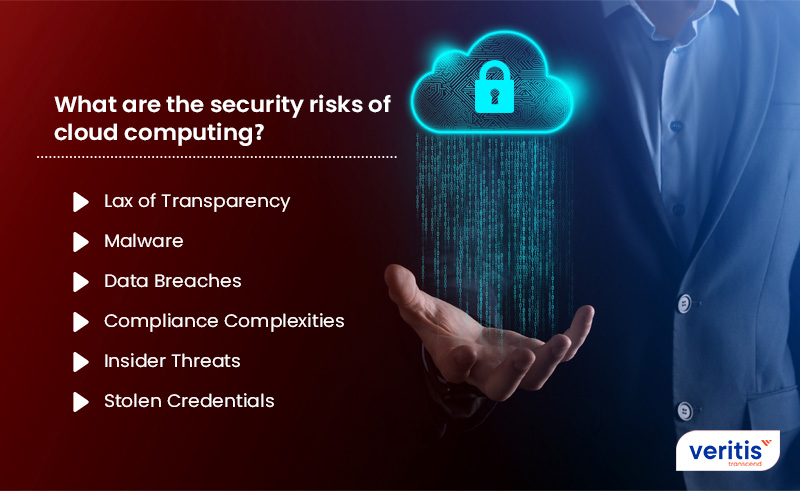
The lack of different perimeters in public cloud data security creates a fundamentally different security reality. Furthermore, adopting contemporary cloud strategies like automated Continuous Integration and Continuous Deployment (CI/CD) techniques, distributed serverless architectures, and transient assets like Functions as a Service and containers makes this even more difficult.
• Lax of Transparency: The infrastructure layer is entirely in the control of the cloud providers in the IaaS model, and it is not made available to the clients. The PaaS and SaaS cloud models further extend the lack of visibility and control. Customers using the cloud frequently struggle to visualize their cloud environments or accurately identify and measure their cloud assets.
• Malware: 90% of businesses that migrate to the cloud are more likely to suffer data breaches. To protect your data, cloud security providers have made an effort to incorporate all the essential security methods. But cybercriminals have also improved! They are accustomed to these contemporary technologies. As a result, they may now easily access sensitive user information and get around most of these regulations.
• Data Breaches: 64% of survey participants cited data loss or leakage as their top cloud security risk. Brands also expose their data more by ceding some of their control to the CSP. For instance, if the cloud security provider experiences a data breach, there is a much-increased risk that critical information about your company would get into the wrong hands.
• Compliance Complexities: Cloud computing security solutions are expanding at a breakneck rate. Therefore, you must ensure that the cloud security providers match your data access and storage demands with the necessary privacy and security guidelines.
• Insider Threats: Insiders who misuse their permitted access to the networks, systems, and data of the company or CSP, such as employees and administrators, are in a unique position to cause harm or exfiltrate information. Because an insider can provision resources or carry out illicit operations that require forensics for identification while using IaaS, the damage is probably worse. With cloud resources, these forensic skills might not be possible.
• Stolen Credentials: Assuming an attacker gets a user’s cloud credentials, the attacker can target the company’s assets and utilize the CSP’s services to supply extra resources (if the credentials allow for such access). The attacker might employ cloud computing resources to target the CSP administrators and other organizations using the same CSP or administrative users within the enterprise. The systems and data of the organization may be accessed by an attacker using the cloud credentials of a CSP administrator. The administrator positions that apply to CSPs and organizations differ. Depending on the service, the CSP administrator has access to the CSP network, systems, and applications of the CSP infrastructure. Still, the customers’ administrators only have access to the organization’s cloud implementations.
Useful link: What You Should Know About Containers Threats in Cloud Computing
What Types of Cloud Security Solutions are Available?
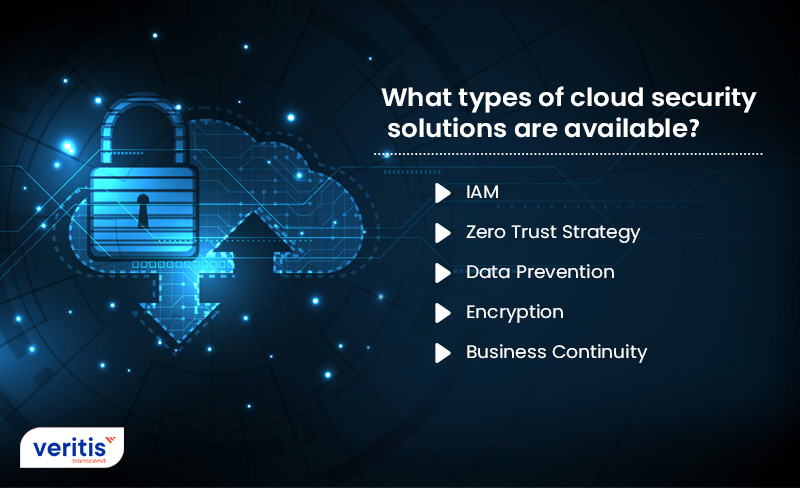
Various types of cloud security services are available, and your MSP assesses your needs and provides an appropriate solution. But, generally, there are some commonly used cloud computing security solutions.
• IAM: Cloud security providers can implement policy-driven enforcement methods for all users attempting to access both on-premises and cloud-based services by using identity and access management services and tools. IAM’s primary function is to give all users digital identities so they may be tracked and regulated actively during all data exchanges.
• Zero Trust Strategy: The zero trust policy limits the user’s access to company resources based on the login location. For instance, a cloud security company can only issue access grants to its employees if they are connected to its internal or virtual private network. Thanks to this authentication, threats cannot enter because there is no room for them.
• Data Prevention: The security of regulated cloud data is ensured by a set of tools and services provided by data loss prevention (DLP) services. All stored data is protected by DLP systems using a combination of remediation warnings, data encryption, and other preventative measures.
• Encryption: Any cloud security provider that wants to thrive must utilize encryption. It deters criminal activity and prevents the release of confidential company information. A strong encryption client should be used and installed on all devices within the organization.
• Business Continuity: Data breaches and disruptive disruptions can still happen despite the precautionary precautions enterprises have in place for their on-premise and cloud-based infrastructures. Enterprises must respond rapidly to newly identified vulnerabilities or significant system failures. Disaster recovery solutions are a cornerstone of cloud security and give businesses the tools, services, and standards required to quickly recover lost data and get back to business as usual.
How Should You Approach Cloud Security?
Let’s face it. The cloud environment is very fluidic. You should know that cloud computing security solutions will not work out if it is rigid. It should accommodate your changing interests, and your MSP should have a sound understanding of your business strategies.
You should first sensitize your cloud security providers as to your priorities and allow ample time for your MSP to understand your existing infrastructure. Your MSP should also brief the necessary stakeholders about the changes that shall seep into the company.
With the ample experience we amassed by advising Fortune 500 companies, Stevie-Award Winner, Veritis has remained the preferred cloud consultant partner for most companies. So, reach out to us, and we shall dole out the cloud computing security solution which suits you best.
Talk to our Cloud Computing Expert
Additional Resources:
- 6 Ways AIOps Optimizes Cloud Security
- Cloud Computing in Healthcare: Looking for Security Advantage?
- The Biggest Clouds Myths that Every Organization Must Do Away With
- Security Breaches Rising Exponentially; Weak Authentications Exploited
- Serverless Vs Containers: Comparison Between Top Two Cloud Services
- AWS Vs Azure Vs GCP – The Cloud Platform of Your Choice?
- Global Cloud Market to Reach Nearly USD 800 Billion by 2028: Survey
- Zero Trust Strategy, the Modern Security Solution for Cloud